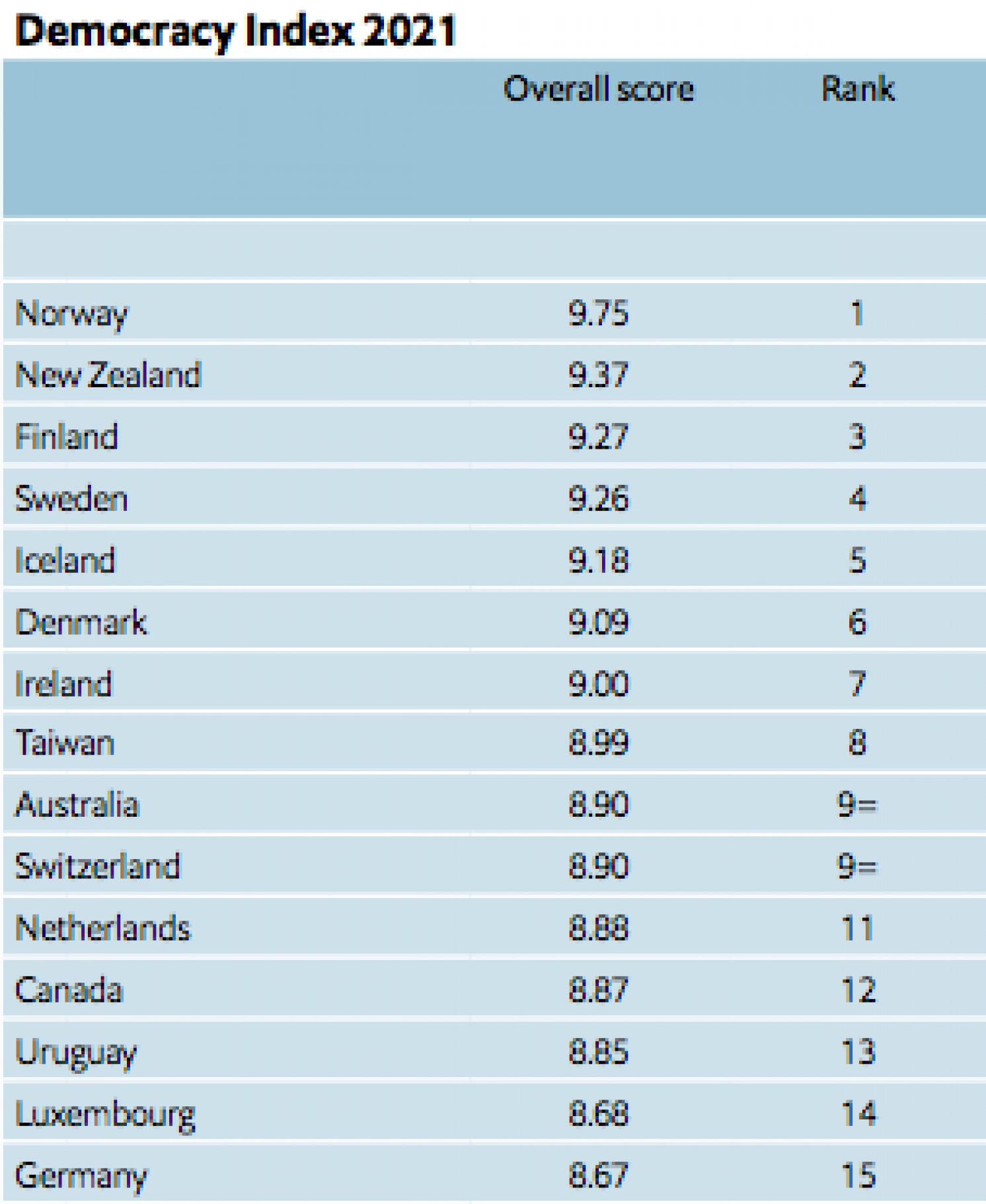
Is Taiwan a Gold-Plated Democracy?
By Wang Chien-chuang
United Daily News, February 20, 2022
Taiwan's democracy index has been rising in international rankings. Last year, the Economist Intelligence Unit (EIU) published its 2020 Democracy Index report, in which Taiwan was ranked 11th in the world for the first time from a flawed democracy to a fully democratic country. In the 2021 report released recently, Taiwan's ranking has risen to eighth in the world, and Taiwan has seemingly become a model student of democracy.
Compared to last year's report, the ratings of election process and pluralism, government effectiveness and political culture are the same this year, at 10, 9.64 and 8.13 respectively, but the rating of political participation has increased from 7.12 to 7.78, while the rating of civil liberties has dropped from 9.71 to 9.41. Taiwan's overall rating has increased from 8.94 to 8.99,
And just like last year, Taiwan's democracy index has once again surpassed that of the United Kingdom and caught up with the United States, with the United Kingdom ranking 18th in the world with a total score of 8.1 and the United States ranking 26th with a total score of 7.85. Although Japan and South Korea are both fully democratic countries, South Korea ranks 16th with a total score of 8.16, while Japan ranks 17th with a total score of 8.15. There is still a considerable gap between Taiwan and those two Asian nations in their performance.
However, the reason for the jump in Taiwan's democracy index for the second year in a row has to do with the continued severity of the pandemic. While most countries did poorly in civil liberties because of their strict preventive measures such as lockdowns or city closures, Taiwan has just done the opposite. The reason why Taiwan scored high was the pandemic did not seriously infringe on civil liberties. Furthermore, its relatively low number of confirmed cases and death cases made it known as the world's most effective government for the second year in a row.
In other words, Taiwan's democracy index has risen so quickly thanks to the pandemic. After the pandemic is over, the greatest stress test of Taiwan's democracy will be whether the glory that Taiwan has unexpectedly gained from the pandemic will peter out or not.
Moreover, the criteria developed by the EIU in its surveys of different countries obviously vary in its own political spectrum. The performance of some countries, such as the United States, is viewed through a microscope, while the performance of others, such as Taiwan, is viewed through a telescope.
To Take the United States as an example, growing polarization between political parties and societies has been described by the EIU as negative manifestations of democracy. But why is the polarization in Taiwan, as serious as in the United States, not considered as negative manifestations of political culture?
In other words, if the EIU did not look at Taiwan's democracy from afar, instead it could use its close-up lens to look at three things: firstly, the polarization in this island republic, secondly, the partiality shown by most of Taiwan's televised news stations, and thirdly illiberal democracy in Taiwan's parliament. All originated from the dominance of the ruling Democratic Progressive Party. Would Taiwan's democracy still shine so brightly?
Though the pandemic will come to an end sooner or later, the EIU’s Democracy Index would be published every year. Before the pandemic, Taiwan's democracy had long been ranked as a flawed democracy, always in the 30s. During the pandemic, it was ranked 8th. Can Taiwan’s democracy be viewed thru a telescope rather than a microscope? Is it a gold-plated democracy? The real truth will be revealed only after the pandemic.
The author is visiting professor at Shih Hsin University.